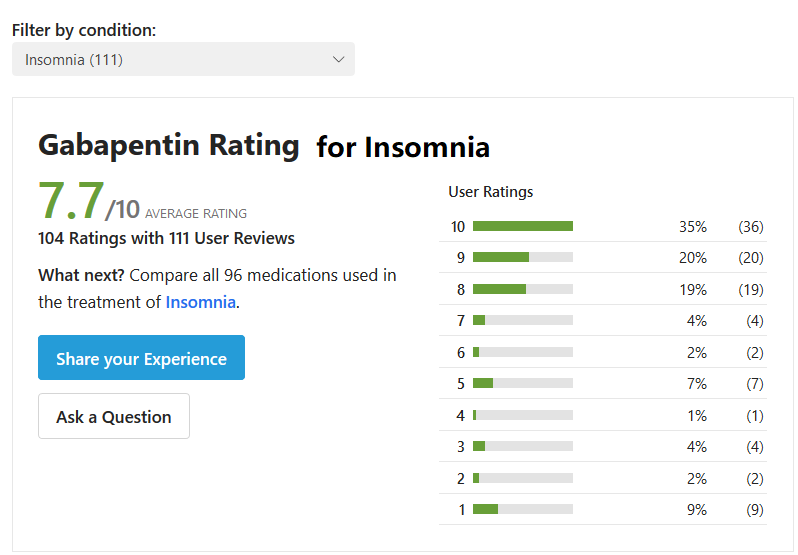With gabapentin’s calming and anti-anxiety effects, it’s not surprising that studies have found it to be helpful in treating insomnia and sleep disorders.
Many anti-anxiety medications, particularly those with sedative-like effects, can help users fall asleep more easily.
One interesting aspect of gabapentin’s effect on sleep (in the limited research available) is its impact on quality of sleep.
In one 2010 study, gabapentin not only helped to treat study participants’ insomnia symptoms by decreasing spontaneous arousal — like waking up in the middle of the night — but it also improved their sleep quality by enhancing slow-wave sleep.
Slow-wave sleep, also known as deep sleep, is the type of sleep that makes individuals feel rested in the morning.
During this important stage of sleep, the pituitary gland secretes much-needed hormones, like the human growth hormone, which is essential to the repair and development of the cells in the body. During deep sleep, glucose metabolism in the brain also increases, supporting memory and learning.
Gabapentin was shown to increase sleep efficiency and allow for longer, deeper sleep.
How Does Gabapentin Affect Dreams?
There is limited research available on gabapentin’s effect on dreams, but many online reports and comments in online forums indicate users may experience especially vivid dreams, especially when they first begin taking the drug.
If users begin to experience problematic dreams or night terrors, they should immediately consult their doctor.
Why Is Gabapentin Used?
Gabapentin is a prescription drug most commonly used to treat seizures and postherpetic neuralgia (pain from nerve damage caused by shingles).
It also prescribed by psychiatrists to treat anxiety.
Gabapentin is taken orally, as a capsule, and it is available under the brand name Neurontin. Before choosing gabapentin as a medication option, it’s helpful to understand more about the drug, including how it actually affects sleep and sleep quality.
How Does Gabapentin Work?
Gabapentin is classified as an anticonvulsant drug.
Because of its name, many think gabapentin works by interacting with GABA (gamma-Aminobutyric acid) receptors in the central nervous system, as many other sedative-type medications do. This is not the case.
It’s not fully understood how gabapentin works, although there are indications it affects calcium levels to treat different disorders.
For postherpetic neuralgia, it is thought to prevent the increase in sensitivity that occurs as a result of the pain the condition causes. Thus, users feel less pain and reduced sensitivity.
This soothing of nerve sensitivity, and the relaxing effect it can produce, is also why gabapentin is prescribed by psychiatrists to treat anxiety.In its treatment of seizures, gabapentin seems to manipulate the effect and levels of calcium. Low levels of calcium may cause seizures.
Withdrawal and Sleep
While gabapentin may be considered a safer alternative to other sedative-like medications, like benzodiazepines, it has many side effects, including sleepiness, trouble speaking, hostility, and viral infections. Side effects may also include increased pain sensitivity and irritability.
More serious side effects include allergic reactions, dangerous drug interactions, and changes in mood or behavior. If it appears that a user is experiencing suicidal thoughts, emergency medical help should be sought after immediately. Gabapentin can increase the risk of suicide.
Users of gabapentin can become dependent on the drug, and withdrawal symptoms can be severe, including sweating, gastrointestinal problems, tremors, and increased heart rate. Reports indicate that users may begin to experience their worst withdrawal symptoms about three days after stopping the drug. Some of the most common withdrawal symptoms of gabapentin are sleeplessness and sleep problems.
Individuals with a history of mental problems or substance abuse problems may be at more risk for experiencing severe withdrawal symptoms from gabapentin and should not attempt to quit gabapentin “cold turkey” or without the supervision of a medical professional. Those with a history of epilepsy, bipolar disorder, psychosis, and depression should only undergo gabapentin withdrawal and detox in a medically supervised setting. Users should consult with a medical professional to determine a withdrawal plan for tapering off the drug rather than abruptly discontinuing use.
Conclusion
Gabapentin is considered a safe and effective treatment for seizures, nerve pain, and anxiety. It has also shown promise as a sleep aid and possible treatment for insomnia. It may even increase sleep quality and efficiency.
More evidence-based research is needed to conclude that gabapentin is safe for long-term use as a sleep medication, however, especially since it has shown some potential for abuse and the withdrawal symptoms may be severe, negatively impacting sleep.
Gabapentin users with a history of mental illness, substance abuse, or epilepsy should only attempt detox and withdrawal from gabapentin in a medically supervised setting.
Gabapentin reviews for treating Insomnia



I have been taking 200mg Gabapentin for 2 weeks to help with sleep and anxiety. The first week, I had my concerns. Dry mouth, head ache and dizzy.
But I stuck with it and continued to take it since it was helping with my sleep. Now after 2 weeks, I am having no side effects and sleep well.
I go to sleep easily and stay asleep for 7-8 hours. I am feeling calmer during the day, my anxiety is much better. For me, I’d have to grade this med a 10
I have taken a lot of meds for sleep because I have bad insomnia. And I can get to sleep but always wake up about 3-4 times a night I have taken a lot of benzodiazepines.
And they help but I don’t feel refreshed when I do sleep. I always feel tired and with no energy. I was put on gabapentin and been on it awhile but I’m on a very high dose because my tolerance is so high I’ve taken up to 2600 mg.a day it helps with my anxiety.
And sometimes sleep I’ve got to where nothing helps me anymore..any suggestions would be helpful
Hi. I’ve been prescribed Gabapentin 100mg 2 times daily in the past and again recently to no avail for sleep and anxiety, so I put them aside and gave up until recently after viewing other people’s comments I talked to my doctor about upping the dose as I saw that many people were on a much higher dose than I was. He agreed knowing I have a high tolerance to most medications and preferred I use it instead of Xanax. He told me to take 200mg 2 times a day and I I finally felt something that relaxed me but not so I could stay asleep at night, so again he upped my dose to 300mg 2 times daily.
Now I am calm in the day and have no problem falling asleep after relaxing for a few hours before bed. Also, I did not have any side effects at all using Gabapentin.
Many comments posted say that it’s a matter of getting the right dosage for you and it seemed that was true in my case also. So any one out there struggling like I did, I suggest you don’t give up and talk to your doctor, you are not alone.